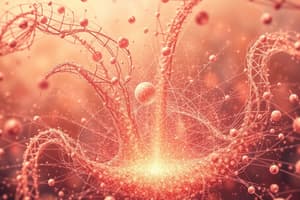Podcast
Questions and Answers
What does the term 'kinetic' refer to in the context of the particle model of matter?
What does the term 'kinetic' refer to in the context of the particle model of matter?
- The energy of anything that is moving (correct)
- The energy of stationary objects
- The energy stored in solids
- The energy produced by chemical reactions
How does the kinetic energy of particles in a solid compare to that in a gas?
How does the kinetic energy of particles in a solid compare to that in a gas?
- Particles in a solid have more kinetic energy than in a gas
- Particles in a gas have the highest amount of kinetic energy (correct)
- Kinetic energy is the same in solids and gases
- Particles in a gas have less kinetic energy than in a solid
What is mass defined as?
What is mass defined as?
- The density of a substance
- The amount of matter in a substance (correct)
- The weight of a substance in a vacuum
- The volume of a substance
What happens to the kinetic energy of people when they are running?
What happens to the kinetic energy of people when they are running?
In which state of matter do the particles vibrate but do not move freely?
In which state of matter do the particles vibrate but do not move freely?
How does the mass of a particular volume of solid or liquid compare to the same volume of gas?
How does the mass of a particular volume of solid or liquid compare to the same volume of gas?
What is the relationship between the kinetic energy of particles and their speed of movement?
What is the relationship between the kinetic energy of particles and their speed of movement?
What occurs when the lid is removed from a bottle of perfume?
What occurs when the lid is removed from a bottle of perfume?
Why does diffusion occur fastest in gases?
Why does diffusion occur fastest in gases?
What distinguishes lead from aluminium in terms of atomic structure?
What distinguishes lead from aluminium in terms of atomic structure?
What describes the diffusion of particles in liquids?
What describes the diffusion of particles in liquids?
What phenomenon explains the considerable energy released during storms?
What phenomenon explains the considerable energy released during storms?
What happens to particles in a solid regarding diffusion?
What happens to particles in a solid regarding diffusion?
Which state of matter corresponds to particles jostling about?
Which state of matter corresponds to particles jostling about?
Which scenario is an example of diffusion?
Which scenario is an example of diffusion?
What effect does stirring have on diffusion in liquids?
What effect does stirring have on diffusion in liquids?
Flashcards are hidden until you start studying
Study Notes
Kinetic Theory of Matter
- The particle model of matter underpins every observation and experiment, highlighting the constant movement of particles.
- Kinetic energy relates to the energy of moving objects; particles possess kinetic energy proportional to their speed.
- The kinetic theory of matter explains the behavior and properties of solids, liquids, and gases based on particle movement.
Particle Energy in Different States
- In solids, particles vibrate but do not move freely, resulting in low kinetic energy (similar to people sitting quietly).
- In liquids, particles jostle and have more kinetic energy due to increased movement (similar to people moving in a crowd).
- In gases, particles move rapidly and independently, possessing the highest kinetic energy (similar to people running).
Mass and Density
- Mass, measured in kilograms, reflects the amount of matter in a substance and varies with the number and mass of particles.
- A specific volume of solid or liquid is denser than the same volume of gas due to a higher number of particles being packed into the solid or liquid state.
- For example, a container with liquid nitrogen is heavier than the same-sized container of nitrogen gas because liquid nitrogen has more particles.
Diffusion
- Diffusion describes the process where particles spread from an area of high concentration to low concentration, evident when uncapping a perfume bottle or tea bag in hot water.
- The rate of diffusion is fastest in gases due to free movement and ample space between particles.
- In liquids, diffusion is slower; particles are in close contact and collide frequently, limiting their movement.
- Solids do not undergo diffusion as particles are fixed in place and vibrate without changing positions.
Studying That Suits You
Use AI to generate personalized quizzes and flashcards to suit your learning preferences.




